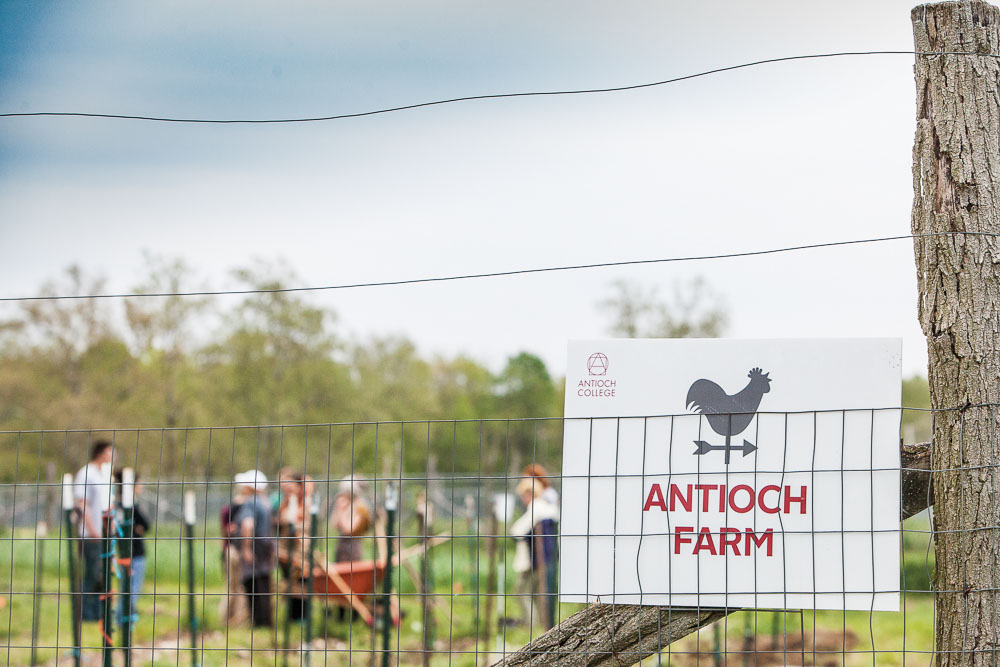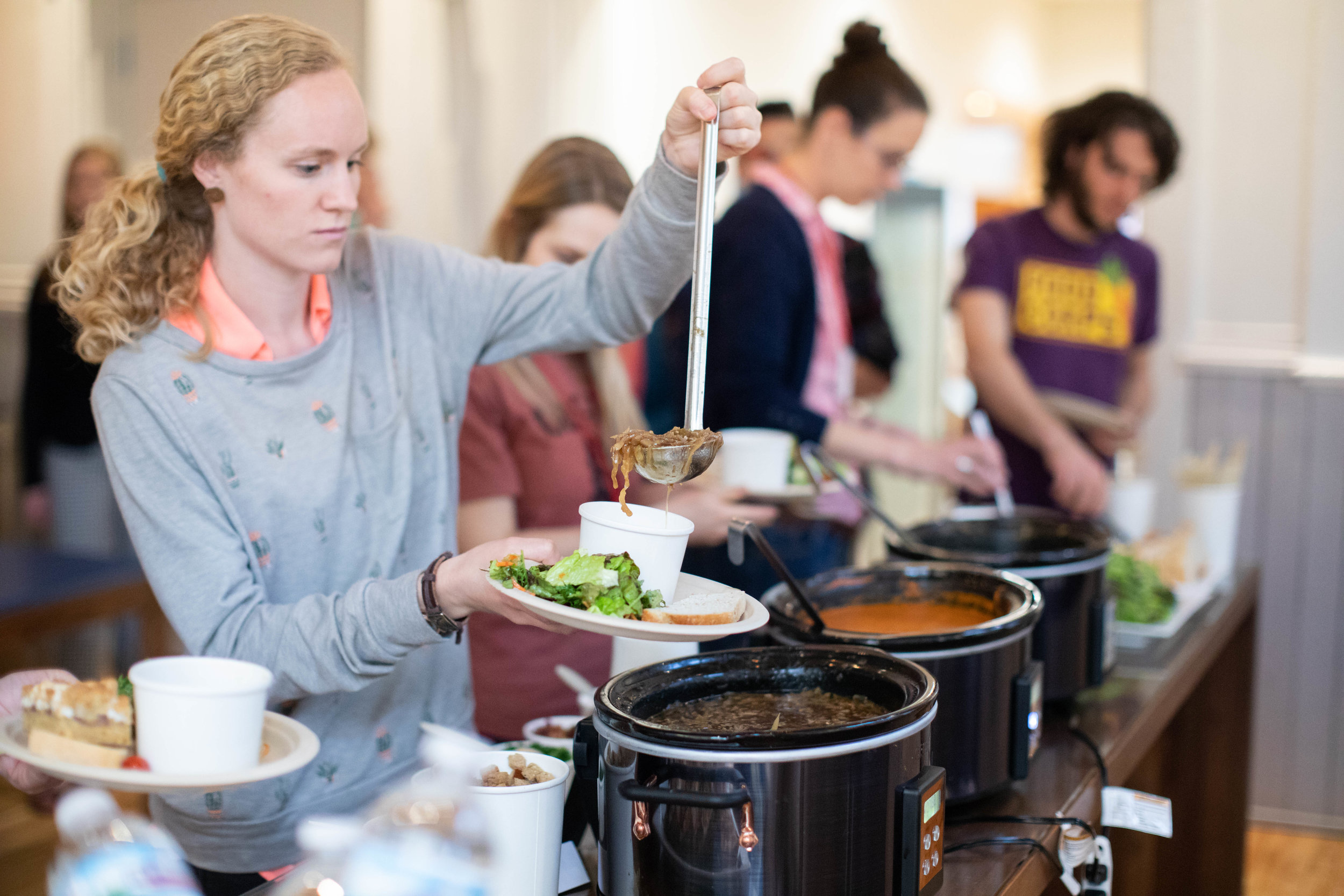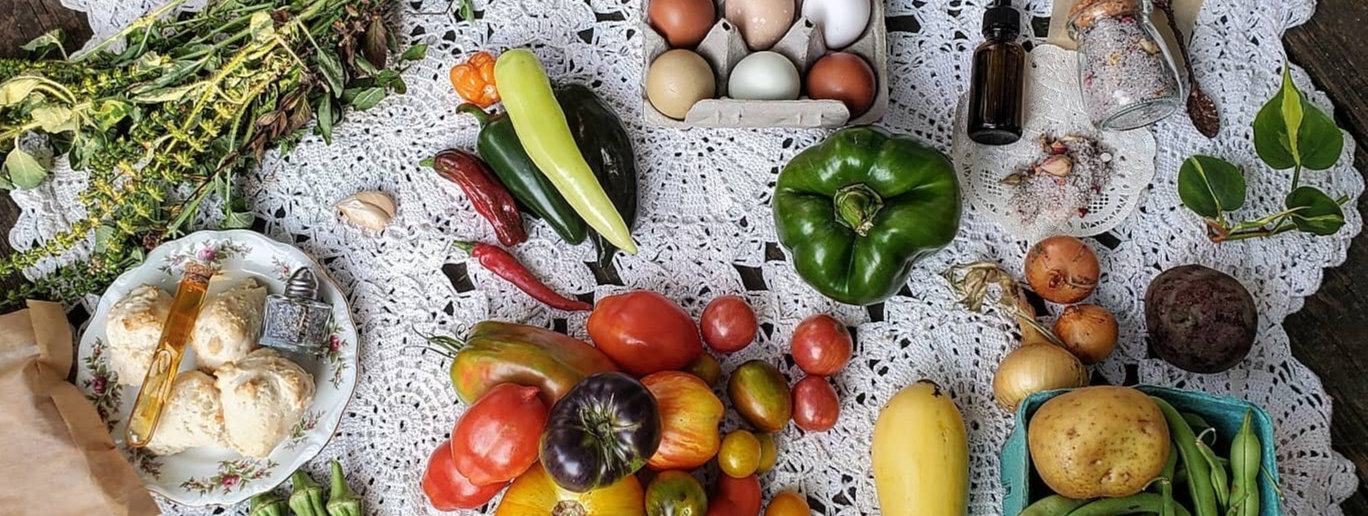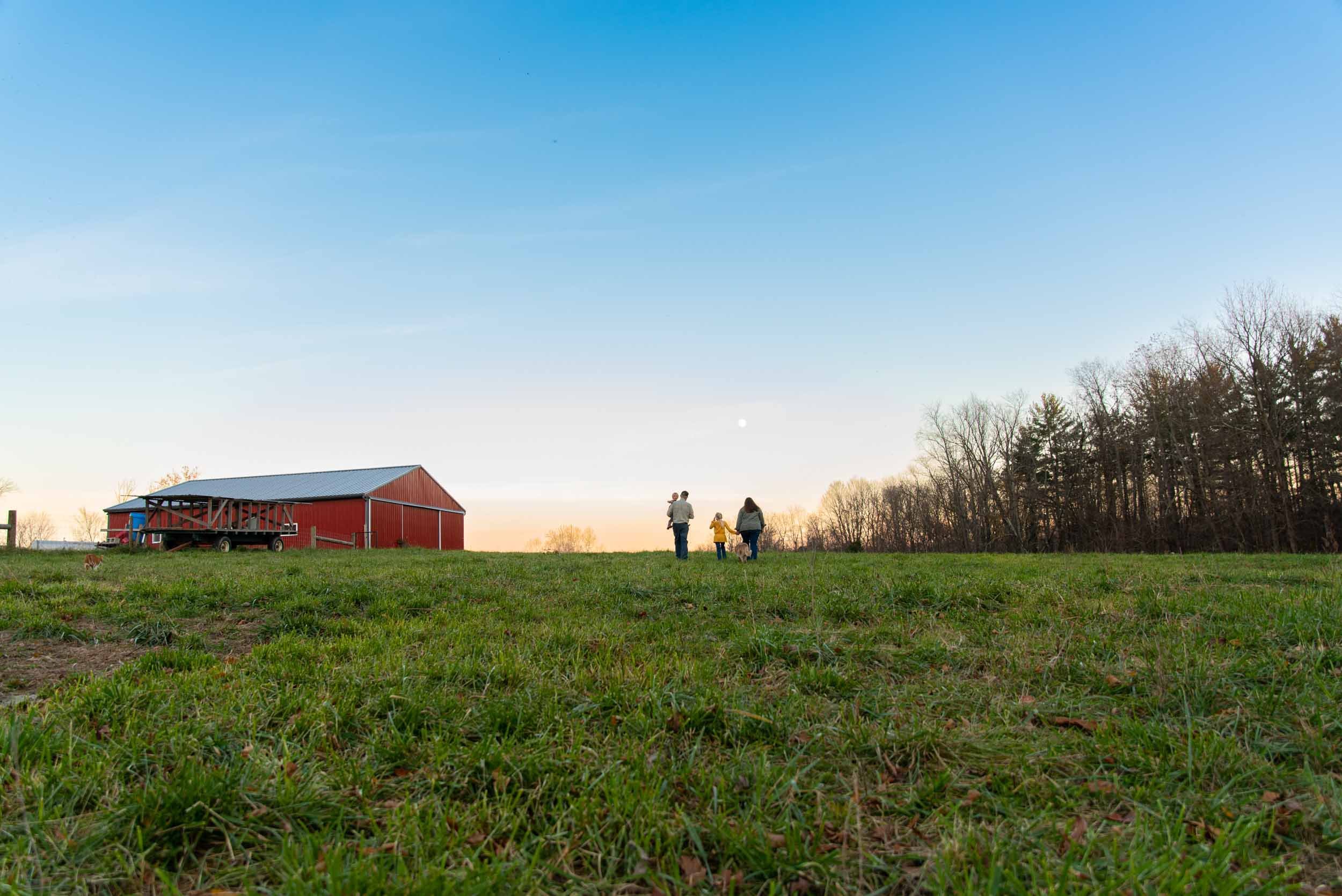A New Model for Foodservice

photography by Natalie Jeanne
Small and mighty Antioch College in Yellow Springs, Oh, ranks #2 in the U.S. for serving locally sourced food to students, faculty, parents, and visitors.
If you’ve ever eaten in a college dining hall—as a student, a parent, an alumnus, or simply a visitor passing through campus—your experience is probably similar to mine. You have an array of food court options like personal pizzas, spaghetti and meatballs, variations on General Tso’s Chicken, maybe something Mediterranean, and most likely a fully stocked, yet two-leaf salad bar.
It’s no secret that the food most colleges serve is overpriced and usually impacts the local economy insofar as local residents are hired to prepare and sell it. This system, often operated by a third-party vendor, has two objectives: feed the students and make a profit. A simple enough equation, to be sure, that produces more satisfied customers and stakeholders than not.
But at Antioch College in Yellow Springs, OH, there is a different equation in place: feed students better and help create a local, sustainable food system.
From the Ground Up
For Antioch, this alternative food system developed as part of the life cycle of the institution itself: through closure and reopening. In 2008, the historic college that had become an epicenter of social justice movements in the 1960s and a model of progressive student life in the 1990s closed its doors. In 2011, after a group of dedicated alumni, former faculty, and community visionaries secured funding and conceived a plan for a different model of higher education, those doors reopened. The new Antioch College, not forgetting its past but forging ahead with a renewed spirit, vowed to continue making disruptive change, to remain deeply engaged with the social causes of our time, and to develop a sustainable model for liberal arts education. And so an alternative approach to food became one of the school’s first endeavors in its new mission.
The first step was to hire someone with a passion for local food, and someone with a sustainable plan to immediately implement. Isaac Delamatre, Antioch’s first chef and now its food service coordinator, didn’t waste a minute in setting the college up to build something different. “I knew even before I started what kind of system could work and really make a local food impact,” he says. “There are already so many farmers who have such good and diverse products right here in our corner of the Midwest.”
The first phase was to begin an intense local purchasing program, an effort that has only increased. “The practice has been the same since I first started: It’s about building relationships with local growers and producers. I tour the farm, take a look their farming practices, and we have a conversation about our ecological outlooks,” he says.
Those conversations are a crucial element of this system. It’s one thing to buy produce within a certain mile radius. It’s another thing entirely to build a working relationship with a farmer grounded in a holistic understanding of food: its role in our economy and ecosystem, its impact on the health of our bodies and communities.
By the numbers, this system comprises a network of 14 growers and producers that account for 56% of the college’s food, placing the it second in the country in terms of local food consumption. Only Sterling College in Vermont consumes more, at 74%, albeit they didn’t just reopen in 2011. Of those 14 providers, 13 are within 30 miles of the kitchens where Delamatre’s staff of two chefs, four chef’s assistants, and more than 30 student workers prepare three meals a day. The 14th is a meager 127 miles away near Sandusky—a fruit farm that Delamatre says is worth the trek.
Isaac Delamatre, Antioch’s first chef and now its food service coordinatorwith Kat Christian, the farm manager
Campus Farm to Table
However, one of the largest local producers that supplies Delamatre’s kitchens, and perhaps the most unique of his 14 vendors, is the 9-acre plot of land that sits approximately 1,500 feet south: The Antioch Farm.
The Farm consists of a 2-acre annual growing area that provides the majority of the harvested food, including heirloom tomatoes, pole beans, colorful potatoes, mixed salad greens, and other staples of the Antioch student diet. Adjacent to this is a 5-acre pasture for animals that includes a solar array (which produces 30% of the college’s power) under which a grazing, seasonal herd of 7 to 10 sheep provides natural lawn care and hearty lamb options for the kitchen.
Finally, two food forests sit on the remaining 2 acres and contain edible trees, shrubs, berries, and herbs, as well as a pollinator path that provides food and habitat for native pollinators, essential for the ecological development of the surrounding land. In all, the farm produces 28% of the college’s food. Last year, more than 7,000 pounds of produce was grown at the farm and carted, often carried in crates on foot, to the two campus kitchens.
Kat Christian, the farm manager since its establishment in 2011, says the farm, like the food system it operates within, is an extension of the college’s mission. “The farm was started as a tangible effort for the college to exist sustainably,” Christian says. “Every edible thing we grow and produce helps feed our students,” she says, “and the six principles that guide our growing are essential to how we operate sustainably.”
These include focusing on environmental and economic sustainability, healthy soil, biodiversity, and local water quality. The sixth principle is how Christian manages the day-to-day operations and how the college is unique among local farm-to-table practices: experiential education.
Because Christian is the only full-time employee at the Antioch Farm, she relies heavily on student workers. “They do everything that’s required of the day-to-day at a working farm, and they also are learning everything in the process,” she says. This makes the farm a learning laboratory as well as an essential supplier to the college’s kitchens and dining halls.
Christian says that students develop skills to manage projects, support social initiatives, work as a team, and take part in the complete food production process. “Our students are learning through hands-on experience one of the most natural processes of being human: growing and harvesting food,” Christian says, “and this teaches them about food and the land, but it also teaches them about leadership and organization, and provides them with an ecological understanding and appreciation.”
Part of a Movement
The foundation for this daily model of farm-to-table in their food system, farm practices, and relationships with local growers is anchored in Antioch’s sense of social responsibility as much as it is in the fertile space on which the food is produced. And this responsibility doesn’t appear to be waning. In 2015, the college signed the Real Food Challenge (RFC), a nonprofit initiative focused on changing the way we grow and eat food, particularly on college campuses. The RFC’s primary goal is to shift $1 billion nationally of existing university food budgets away from industrial farms and overprocessed “junk” food toward more local, ecologically sound, and humane food sources.
It’s a move toward what the RFC identifies as “real food”—produced using sustainable practices and consumed within 150 miles of that production. And it’s a move that is striving to make a difference by 2020. Taking aim at mass-market college food systems to develop a healthier, more fair, and ecologically sound approach on campuses, the RFC and Antioch see the challenge as not just a path toward better food in dining halls, but as a mission for social progress. Antioch’s commitments include serving over 60% “real food,” purchasing only single- or direct-source coffee, institutionalizing a Real Food Calculator, establishing a Food Systems Working Group within the local community, and developing education programming to support local food initiatives.
Christian believes this commitment entails putting good food on students’ plates as well: “There is a real vulnerability to food access and to climate change,” she says, “and what we need most, in terms of food production and environmental sustainability, is to pursue models of resilient, sustainable farming.” As an institution, Antioch is thinking about how they produce and purchase what they eat and considering how best to support a regional food system, rather than being just another client of a large foodservice corporation.
For Delamatre, this commitment is more than creating a model; it’s about creating a working, dependable system. “I’ve worked in food professionally, talked to other chefs and organizers at other schools, and this, what we’ve built here, rarely exists or functions in those places.”
Delamtre says it’s partially about the climate of the college: “Our political game at Antioch is one that’s conducive to producing the right type of food the right way.” He also says that building a sustainable system like Antioch’s hinges on the power of real relationships: “A couple of years ago, when the avian flu was sweeping across the East Coast, the prices of eggs soared to an average of about $2.80 for a dozen. My egg farmer in Xenia could have justifiably hiked his prices to match what was happening around the country, but he didn’t. I didn’t ask him to keep them down. He just didn’t raise the prices because that would cause pressure on my end and then create a ripple effect in our system. He’s growing eggs in Xenia. I’m buying them in Yellow Springs. And we depend on each other to make this work.”
Visit Antioch’s Supplier Farms
Here are a few of the local farms that help feed Antioch students and are also open to visitors.
Keener Farm
KeenerFarm.com
555 N. Lutheran Church Rd.
Dayton, OH
This farm has been around since 1830. With a specialization in grass-fed beef and pastured poultry, they are dedicated to raising ethically produced, hormone-free meat.
Patchwork Gardens
PatchworkGardens.net
9057 W. Third St.
Dayton, OH
Located in Trotwood, these gardens use organic and permaculture techniques to produce a variety of lettuce and greens almost all year round.
Peifer Orchards
PeiferOrchards.com
4590 U.S. Route 68 N.
Yellow Springs, OH
This orchard produces honey and maple syrup, and specializes in apples, peaches, and pears. They sell their own produce and distribute the produce of other farms and orchards in their on-farm store.
Bowman and Landes Turkey Farm
BowmanLandes.com
6490 Ross Rd.
New Carlisle, OH
This 2,200-acre farm has specialized in turkey farming since 1948. Preferring natural sunshine and open grass, the turkeys are raised without animal byproducts—part of the quality farming that led to a 2007 Ohio Environment Stewardship award. The farm also houses a meat shop and deli on-site.
Julie publishes Edible Ohio Valley with her family. After 15 years in the world of commercial photography, her lens is now focused on recording the sustainability movement in the Midwest. A graduate of UC’s College of Design, Architecture, Art, and Planning, she’s a partner and co-founder of The Fairview Agency, a multidisciplinary creative firm.






